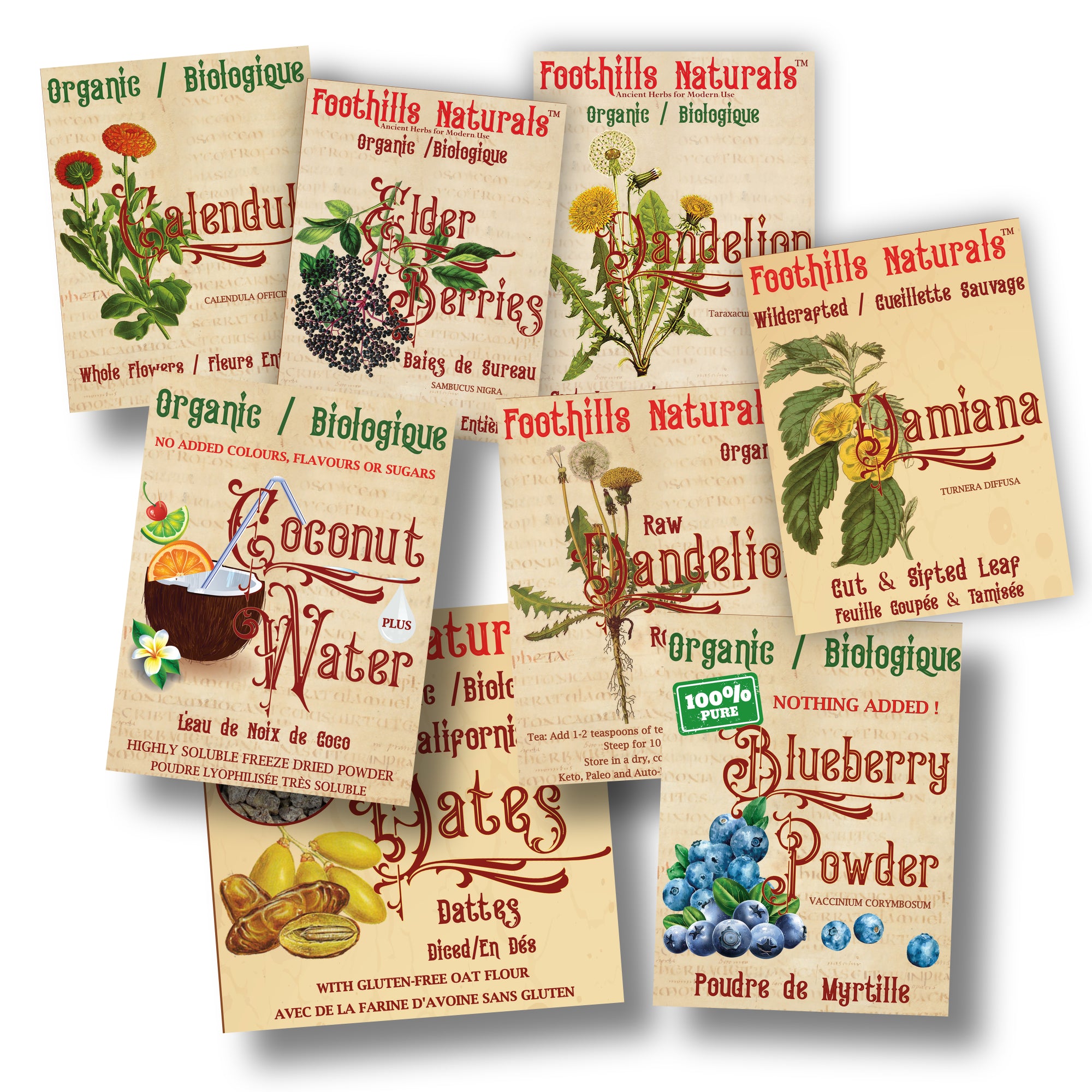Chicory Root – Packed with Nutrition and Health Benefits

Latin Name: Cichorium intybus
Botanical source: Chicory is a perennial herb native to Europe and temperate regions in Asia. It has been naturalized to the United States. his beautiful plant has bright blue flowers and belongs to the dandelion family.
Most popular modern use : as a healthy herbal alternative to coffee, source of prebiotic fiber and herbal supplement, source of antioxidants.
History: Chicory was grown for use as a coffee substitute, vegetable crop, and medicinal plant by ancient Egyptians. It was first grown as a vegetable crop by the Greeks and Romans around 4000 years ago. Those who love research can read more here: Sidana J, Prinsloo G. Cichorium intybus: traditional uses, phytochemistry, pharmacology, and toxicology. Evid Based Complement Alternat Med 2013;2013:579319.
In more modern times chicory root was roasted and used in coffee in Holland around year 1750. It quickly became popular replacement of coffee and by 1790s it was regularly used in the United States. In 1806 Napoleon eliminated coffee imports in an attempt to raise France’s independence and chicory root was used as a complete substitute for coffee, from there is became popular in all French influence territories.

By the late 19th century some coffee brands, in order to lower the cost of coffee production, would use chicory as adulterant in their blends. It was such wide spread practice that New York Times declared that pure coffee could no longer be found.
Modern use:
As a food ingredient: With the growing popularity of plant based meat alternatives the inulin (prebiotic fiber) produced from chicory root has become a common ingredient in those products.
In beverages – Fancy coffee beverages have always been popular, but today an increasing number of clever herbal combinations are replacing them with greater success, eliminating the health problems due to high caffeine consumption, and improving sleep, mood and cholesterol without sacrificing the pleasure of having your favourite mocha. (Try our popular HERBAL MOCHA blend and see for yourself).
In foods – chicory root powder in addition to providing a boost of extra dietary fiber, adds a smooth, creamy texture to foods, which makes it excellent fat replacement in ice creams and dressings.
Health Benefits: Being in Canada most of us are aware that any herbal health benefit claims are strictly regulated by Health Canada. At the moment the government pre-aproved health claim for chicory root is “ Source of antioxidants” This being said the traditional use of chicory for the benefit of our health is well documented in many studies and researches and far surpasses the antioxidant benefit.
Here are some of the traditional health uses of chicory:

Reduces stress: (Use as coffee substitute / decoction). Chicory contains no caffeine and by replacing coffee you eliminate the cortisol increase by combining a high stress lifestyle with caffeine consumption ( 2006 study published in Pharmacology Biochemistry and Behaviour). For added sensory pleasure Chicory combines beautifully with the similarly beneficial dandelion roasted root the result brings your brew even closer to the original coffee taste.
Chicory extracts might lower blood glucose levels. Preparations from both raw and roasted chicory have shown to improve levels of of adiponectin, a protein that regulates blood sugar levels as well aid fatty acid breakdown, which suggests that chicory root extract could delay or prevent the early onset of diabetes as well as improve bowel movements due to its fiber content.
A few caution notes if you are already taking prescription drugs while taking herbal chicory preparations: People with diabetes taking chicory need to monitor blood glucose levels very closely. Dose adjustments to diabetes medications might be necessary. Stop use 2 weeks prior to a surgical procedure. (Research: Street RA, Sidana J, Prinsloo G. Cichorium intybus: traditional uses, phytochemistry, pharmacology, and toxicology. Evid Based Complement Alternat Med 2013;2013:579319.)

Liver Health: ( Prepare chicory root as decoction or an extract) As a source on an antioxidant chicory reduces oxidative stress and block cell damage to promote liver health.
- Traditionally used for liver and heart health, constipation, swelling, and other conditions. – If you love creating your own remedies - Chicory root extract has been used with apparent safety at doses of 600 mg three times daily for one month ( Olsen NJ, Branch VK, Jonnala G, Seskar M, Cooper M. Phase 1, placebo-controlled, dose escalation trial of chicory root extract in patients with osteoarthritis of the hip or knee. BMC Musculoskeletal Disord 2010;11:156. - View abstract) ;
- Chicory seed has been used with apparent safety as a hot water infusion of 4.5 grams twice daily for 12 weeks (Ghaffari A, Rafraf M, Navekar R, Sepehri B, Asghari-Jafarabadi M, Ghavami SM. Turmeric and chicory seed have beneficial effects on obesity markers and lipid profile in non-alcoholic fatty liver disease (NAFLD). Int J Vitam Nutr Res 2019;89(5-6):293-302. doi: 10.1024/0300-9831/a000568.). Sadly finding chicory seed is virtually impossible today.
- Adults (Oral use) - Nonalcoholic fatty liver disease (NAFLD): Chicory seed 4.5 grams infused in hot water twice daily between meals for 12 weeks, with or without turmeric 1 gram three times daily, has been used. (Ghaffari A, Rafraf M, Navekar R, Sepehri B, Asghari-Jafarabadi M, Ghavami SM. Turmeric and chicory seed have beneficial effects on obesity markers and lipid profile in non-alcoholic fatty liver disease (NAFLD). Int J Vitam Nutr Res 2019;89(5-6):293-302. doi: 10.1024/0300-9831/a000568.)
- Henriette’s Herbal ( Henriette Kress, a world renown herbalist from Finland) states the following : The decoction, used freely, is said to have proved efficient in jaundice, engorgement of the liver, and other chronic visceral diseases, as well as in cutaneous eruptions, gout, hectic fever, etc. (Research: King's American Dispensatory, 1898, written by Harvey Wickes Felter, M.D., and John Uri Lloyd, Phr. M., Ph. D.)
Help with Kidney disorders: ( prepare as tea, decoction extract). Some research states that chicory can help prevent renal injury. Chicory could be used as an alternative to alleviate kidney damage caused by high blood uric acid levels.
It is believed that chicory root also has diuretic properties, which may increase urine volume and eliminate toxins from your system. (published: https://www.ncbi.nlm.nih.gov/pmc/articles/PMC6304617/)
Help manage osteoarthritis: ( prepare as decoction, extract). A clinical trial conducted by the Rheumatic Diseases Division at the University of Texas Southwestern Medical Center’s Department of Internal Medicine concluded that the extracts of chicory root may have anti-inflammatory properties that could help treat osteoarthritis. 72% of those who finished the study showed at least 20% improvement in response to pain and stiffness, showcasing chicory’s ability to help treat this joint pain.
Aids gut health: (Use root powder) Chicory root contains inulin, which is a prebiotic. Prebiotics can help promote the growth of beneficial bacteria in the gut and provide relief from irritable bowel syndrome (IBS)
Relieve constipation: (Prepare as tea, extract or root powder) - Chicory root fiber has been shown to relieve constipation thanks in large part to its content of inulin. International Journal of Food Sciences and Nutrition examined the impact of daily consumption of chicory in older adults with constipation for close to 1 month and reported a increased satisfaction about digestion and constipation relief in adults and the elderly.
Improve skin: (Prepare as chicory extract) Studies have shown that chicory root extracts may improve skin barrier function. They may also treat the dryness that accompanies the aging process Chicory root extracts act as an active ingredient and can restructure the skin barrier. These extracts can effectively maintain homeostasis and prevent skin alterations (published: https://pubmed.ncbi.nlm.nih.gov/27161285/)
Help with eczema: Chicory extract was found to have antifungal properties that may help in the treatment of certain forms of Candida. The extract also has fewer side effects (https://pubmed.ncbi.nlm.nih.gov/29109313/)
Anecdotal evidence suggests that chicory root may help treat eczema. You will need two teaspoons of ground chicory root and a glass of boiling water. Add the two to a steam bath for about 30 minutes, and allow the mixture to sit for another 30 minutes. Dip gauze bandages in the liquid and apply them to the affected areas. You can cover the bandage with a plastic wrap and leave it on for about 30 minutes
Herbs can be powerful healing tool. Knowing how they interact with drugs and other herbal supplement allows for safe and effective use!
Pregnancy disclaimer: when used orally in excessive amounts. Chicory may induce menstruation or miscarriage (Brinker F. Herb Contraindications and Drug Interactions. 2nd ed. Sandy, OR: Eclectic Medical Publications, 1998.)

Interaction with drugs: Anecdotal, moderate interference with antidiabetes drugs. Use caution because theoretically taking chicory extracts with antidiabetes drugs might have additive effects, increasing the risk for hypoglycemia in patients taking these drugs. Due to the presence of glimepiride (Amaryl), glyburide (DiaBeta, Glynase PresTab, Micronase), insulin, metformin (Glucophage), pioglitazone (Actos), rosiglitazone (Avandia), and others in those drugs: (Street RA, Sidana J, Prinsloo G. Cichorium intybus: traditional uses, phytochemistry, pharmacology, and toxicology. Evid Based Complement Alternat Med 2013;2013:579319.).
Interactions with other supplements: Some clinical research suggests that the inulin constituent of chicory may increase dietary calcium absorption: (de Kraker, J. W., Franssen, M. C., Joerink, M., de Groot, A., and Bouwmeester, H. J. Biosynthesis of costunolide, dihydrocostunolide, and leucodin. Demonstration of cytochrome p450-catalyzed formation of the lactone ring present in sesquiterpene lactones of chicory. Plant Physiol 2002;129(1):257-268. )
Combinations with other herbs with HYPOGLYCEMIC POTENTIAL: Chicory might lower blood glucose levels. Theoretically, it might have additive effects when used with other herbs and supplements that also lower glucose levels. This might increase the risk of hypoglycemia in some patients.
Some herbs and supplements with hypoglycemic effects include alpha-lipoic acid, bitter melon, cassia cinnamon, chromium, devil's claw, fenugreek, garlic, guar gum, horse chestnut, Panax ginseng, psyllium, Siberian ginseng, and others. (Street RA, Sidana J, Prinsloo G. Cichorium intybus: traditional uses, phytochemistry, pharmacology, and toxicology. Evid Based Complement Alternat Med 2013;2013:579319.)






Hi Beverly, the most popular use of the chicory root seems to be as a herbal coffee substitute, beneficial in lowering caffeine intake and as a source of antioxidants. In granola bars I believe you first need to grind it into powder, if you have purchased granules. Then add it the way you would add cocoa, slowly making sure that the flavour of the mixture remains the way you like it. You would not need much start with a teaspoon and see how you like it- I would suggest searching for chicory use in recipes in preparation of vegan meats. Chicory is one of the spices / herbs used in meatless recipes.
I bought a bag and am having a hard time finding healthy recipes. Everything seems to be. about coffee replacement and desserts. Do you have any recipes to use it in bread or granola bars or savory potatoes etc?
Leave a comment